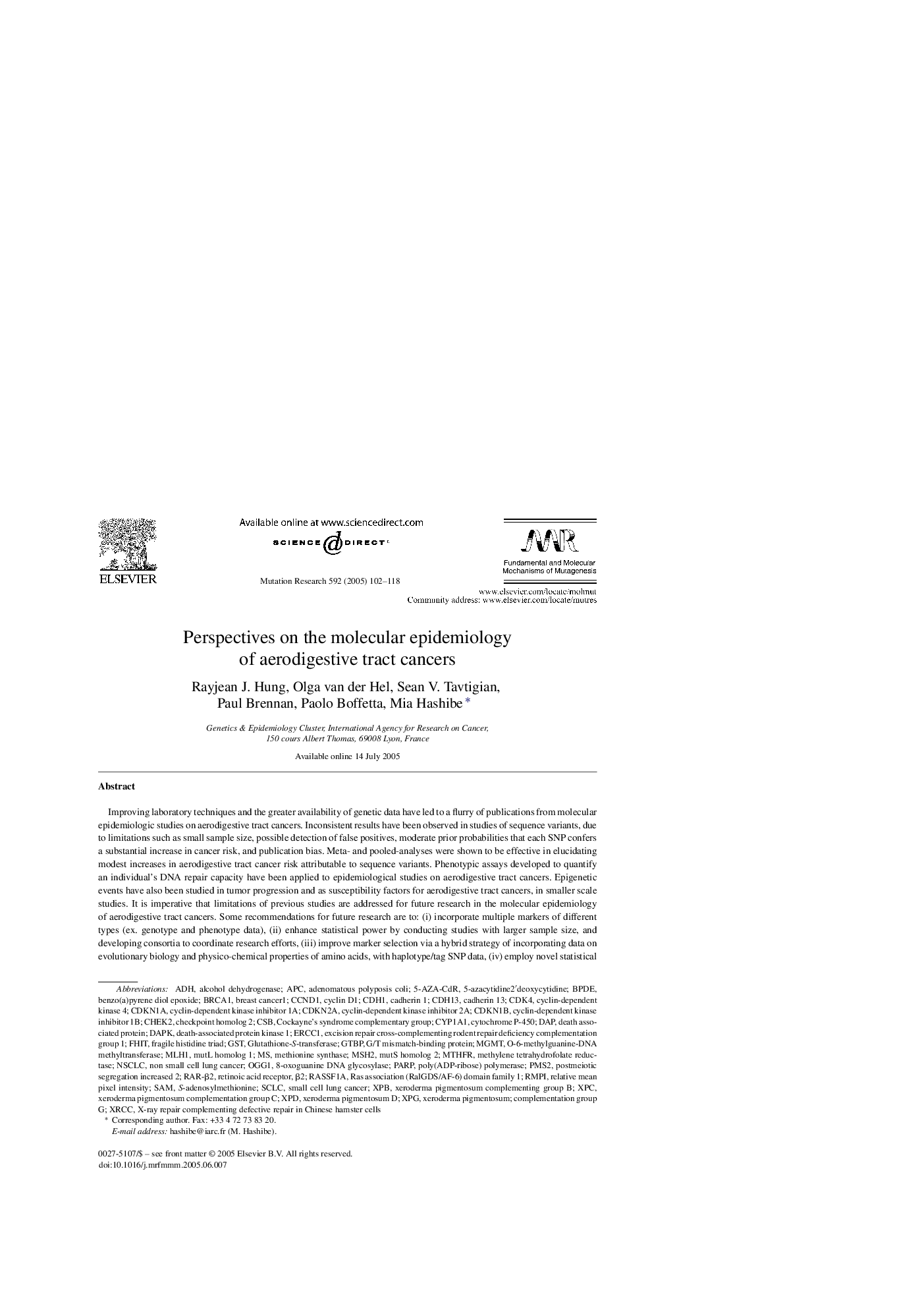| Article ID | Journal | Published Year | Pages | File Type |
|---|---|---|---|---|
| 9908948 | Mutation Research/Fundamental and Molecular Mechanisms of Mutagenesis | 2005 | 17 Pages |
Abstract
Improving laboratory techniques and the greater availability of genetic data have led to a flurry of publications from molecular epidemiologic studies on aerodigestive tract cancers. Inconsistent results have been observed in studies of sequence variants, due to limitations such as small sample size, possible detection of false positives, moderate prior probabilities that each SNP confers a substantial increase in cancer risk, and publication bias. Meta- and pooled-analyses were shown to be effective in elucidating modest increases in aerodigestive tract cancer risk attributable to sequence variants. Phenotypic assays developed to quantify an individual's DNA repair capacity have been applied to epidemiological studies on aerodigestive tract cancers. Epigenetic events have also been studied in tumor progression and as susceptibility factors for aerodigestive tract cancers, in smaller scale studies. It is imperative that limitations of previous studies are addressed for future research in the molecular epidemiology of aerodigestive tract cancers. Some recommendations for future research are to: (i) incorporate multiple markers of different types (ex. genotype and phenotype data), (ii) enhance statistical power by conducting studies with larger sample size, and developing consortia to coordinate research efforts, (iii) improve marker selection via a hybrid strategy of incorporating data on evolutionary biology and physico-chemical properties of amino acids, with haplotype/tag SNP data, (iv) employ novel statistical methods such as hierarchical modeling with Bayesian adjustments, false positive reporting probability and modeling of complex pathways. Consortia have been initiated for head and neck cancer (International Head and Neck Cancer Epidemiology Consortium (INHANCE)) and lung cancer (International Lung Cancer Consortium (ILCCO)) with the aim to share comparable data, to focus on rare subgroups such as nonsmokers and to coordinate laboratory analyses. Such collaborative efforts and integration across disciplines will be essential in contributing to the elucidation of genetic susceptibility to aerodigestive tract cancers.
Keywords
CDK45-Aza-CdRCHEK2MTHFRCDH1MLH1MSH2PMS2CDKN2AXPCDAPKxeroderma pigmentosum DCadherin 1CCND1CDKN1BBPDECDKN1AOGG1CSBRASSF1ACDH13XPDFHITXRCCMutS homolog 2GSTADHSAMXPGDAPXeroderma pigmentosum complementation group CXPBCyclin D1Cyclin-dependent kinase inhibitor 1BMGMTAPCCYP1A1PARP8-oxoguanine DNA glycosylaseMutL homolog 1O-6-Methylguanine-DNA Methyltransferasexeroderma pigmentosumadenomatous polyposis coliS-adenosylmethionineAlcohol dehydrogenaseEpidemiologybenzo(a)pyrene diol epoxideSCLCCancerLung cancerNon small cell lung cancerNSCLCSmall cell lung cancerHead and neck cancercytochrome P-450PhenotypeMethylationmethylene tetrahydrofolate reductaseMethionine synthasecyclin-dependent kinase inhibitor 1Acyclin-dependent kinase inhibitor 2Afragile histidine triaddeath-associated protein kinase 1Poly(ADP-ribose) polymeraseBRCA1ERCC1Genotypecyclin-dependent kinase 4glutathione-S-transferase
Related Topics
Life Sciences
Biochemistry, Genetics and Molecular Biology
Cancer Research
Authors
Rayjean J. Hung, Olga van der Hel, Sean V. Tavtigian, Paul Brennan, Paolo Boffetta, Mia Hashibe,
